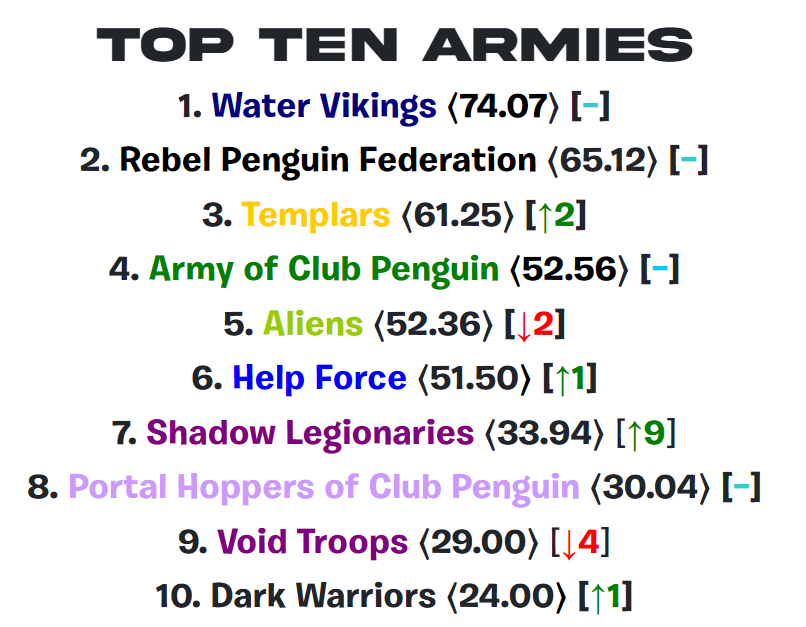In today’s Club Penguin Armies, the real power is not just on the battlefield. Armies have been known to fight, but armies must also write, report, and rewrite. Battles are no longer treated as singular events. They are framed around a larger story told through columns, editorials, and exposés, and yet everything seems like it’s repeating in cycles. The war is real, but the story is what people will remember.

A Sunday Ritual
Every Sunday, the Top Ten is released. Armies respond, some wait with anticipation, others celebrate, and then some complain. Then, the week turns back. Another week’s event schedule is released. Another round of recruitment pings goes out, another themed event is conceptualized, another “returning legend” unexpectedly appears in the server, and another opportunity to advance or regress in the Top Ten is upon us. But still, everything feels the same, because it is. The same names swap positions, the same excuses sit on all our lips, and the same grind takes place. Every week, we see progress, but do we see growth?
Club Penguin armies have always been characterized by cycles. Cycles of leadership, cycles of revival, cycles of hype, and burnout. Some call it tradition, some call it a beautiful loop unifying generations of the same fantastic traditions, some call stagnant cycles of community that endlessly renew and repeat because we don’t know how to do anything else. Whatever it may be, there is no denying it: the loops exist, and we are caught in them. Rituals. Scripts. Habits we treat like innovation. And we must ask ourselves: are we supporting the community or just re-enacting it?

The Eternal Shuffle
The Weekly Clockwork
The Top Ten is the most reliable ritual in the CPA, a week-defining pulse. It’s the scoreboard, it’s the motivator, it’s the pressure cooker. The armies grind away hosting events for placement trophies, the troops will burn out by Sunday, and the journalists grasp for their blurbs before the ink dries up.
But at what point does the Top Ten drown out the events?
The armies aren’t just fighting for the event victories any longer. They are fighting for data points. Size, frequency, AUSIA coverage, anything to feed the algorithm. It’s less about engagement against the other armies and more about scoreboard optimization.

Feels like running on a treadmill, doesn’t it?
Rebirth Is Our Default
Club Penguin Armies doesn’t know how to die. It only knows how to resurrect.
An army closes its doors with an emotional goodbye post that, while it does thank the troops and promise some peace, for now, the brand-new army pops up weeks later in a revival post. A leader quits with an emotional goodbye, only to show up next month on the server just to help out. Entire eras start and end, often with the same people at the head. Farewell posts no longer feel like goodbyes, but rather, they feel like cliffhangers that interrupt a script that those of us who attend this cultural event know too well, say too often.
Even wars feel like reruns. Armies go to war over invasions and insults, and the reality is that the battles rarely feel like new territory. We reset the map, but carry the grudges. The enemies remain, for slightly different reasons. The tactics are mostly the same, but we have some reinforcements.
In a way, there is comfort in that sameness. Relatedness provides stability. Nostalgia glues, keeping the remnants of a fading culture fit tightly together. However, that nostalgia can be confusing. It presents an uncomfortable question: Has our loyalty to innovation over the years dulled our capacity to innovate, or do we simply attach to old customs?

Back from the dead, and reporting for duty
We Loop Because It Works
Here’s the thing: these loops are here because they’ve kept Club Penguin Armies alive.
The weekly Top Ten provides us with a structure, purpose, and stakes. It acts as a timer, resetting the community every Sunday. Every Sunday, armies have to do something, armies have to make plans, and armies have to show up. Consequently, revivals, no matter how stale, create an avenue for grief and renewal. They show us that we can mourn something while also leaving space for a return to it. Traditions, however old or rehashed, are what connect new generations to the burden of the legacy. Uniforms, names, formations, right or wrong, we still feel the dregs of the golden age.
In a community based on a game that technically doesn’t exist, these loops are the game. They are the invisible frames holding up a digital universe that should have fallen apart long ago. Without loops, there probably is nothing. The loops may be all that’s holding up the illusion. If we want CPA to not only survive but thrive, we may need to assess if our biggest strength, our dedication to our traditions, may also be our biggest barrier.
Club Penguin Armies has always straddled the line between game and performance. Troops perform their roles. The server was our stage, and the green room was the war room. Some choreograph their events. Others resurrect armies like seasonal story arcs. We tell stories as they loop around. We say it’s fun, and it is. But it is also ritual. It is maintenance. It is a habit. The act of logging on, lining up, and calling tactics becomes habitual. Even our drama feels scripted. Our retirements, resurrections, and rivalries happen at a predictable pitch. Are we celebrating the past, or are we just anxious about hitting mute?
Zenishira
Associate Editor